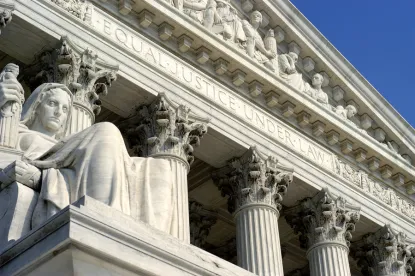Following revocation of Obama Administration transgender guidance, the U.S. Supreme Court has vacated the U.S. Court of Appeals for the Fourth Circuit’s determination that a transgender student had shown a likelihood of success on the merits and the school district probably was violating Title IX by reserving boys’ restrooms for “biological males.” The case was sent back to Fourth Circuit for reconsideration. Gloucester County School Board v. G.G., No. 16-273 (U.S. Mar. 6, 2017).
A February 22, 2017, Dear Colleague Letter from the Trump Administration revoked an Obama Administration Dear Colleague Letter interpreting Title IX’s “sex”-based protections as covering transgender students. (For more, see our article, Trump Administration Rescinds Guidance on Transgender Rights under Title IX.) The Fourth Circuit relied heavily on the Obama Administration’s Dear Colleague Letter in reaching its determination.
In letter briefs filed March 2, both parties urged the Supreme Court to move forward with the scheduled argument because one of the certified questions did not rely on the Obama Administration’s Dear Colleague Letter and was still contested. The Justices chose instead to send the case back to the Fourth Circuit for consideration of the effect of the Trump Administration’s Dear Colleague Letter.
Although G.G. prevailed at the Fourth Circuit (822 F.3d 709 (4th Cir. 2016)), on August 3, the Supreme Court voted 5-to-3 to temporarily stay the order while it decided whether to accept an appeal from the defendant school board. The Supreme Court’s decision to vacate the Fourth Circuit’s holding means the school district is not required to provide G.G. with access to a restroom that matches his gender identity.
If the Supreme Court eventually decides the case, it likely will have a full bench of nine justices. Republicans are hoping to confirm President Donald Trump’s Supreme Court nominee, Judge Neil Gorsuch, in early April to allow him to participate in the Court’s final cases of the term.
In light of the Supreme Court punting on this critical transgender issue, it is important to examine other transgender cases for guidance. For example, a Pennsylvania district court case involving a transgender student was decided on the Equal Protection Clause, rather than Title IX.
Evancho
Gloucester County School Board v. G.G. comes just days after a judge in the U.S. District Court for the Western District of Pennsylvania ruled in favor of three transgender students who sought a temporary stay of a school district policy requiring them to use restrooms that did not conform with their gender identities. Evancho et al. v. Pine-Richland School District et al., No. 2:16-01537 (W.D. Pa. Feb. 27, 2017).
Equal Protection Claim Upheld
In granting the injunction, Judge Mark Hornak found the students had shown a reasonable likelihood of success on the merits of an Equal Protection Clause claim. By forcing the students to use a restroom that did not match with their gender identity, Judge Hornak ruled, they were treated differently than other students on the basis of their gender or sex. “Just as other courts have recently concluded, for these analytical purposes, that discrimination based on transgender status in these circumstances is essentially the epitome of discrimination based on gender nonconformity, make differentiation based on transgender status is akin to discrimination based on sex for these purposes,” he said.
Title IX Claim: “Clouded with Uncertainty”
Although the Pennsylvania court upheld the reasonable likelihood of success on the Equal Protection Clause claim, it expressed uncertainty over the success of the students’ Title IX claims. In addressing the Trump Administration’s Dear Colleague Letter, Judge Hornak stated that it “appear[ed] to have generated an interpretive vacuum pending further consideration by [the Department of Justice and the Department of Education] of the legal issues involved in such matters.”
As a result, Judge Hornak explained, he was unable to rule on the success of the transgender students’ Title IX claims. He said, “Put plainly, the law surrounding the [Title IX] regulation and its interpretation and application to Title IX claims relative to the use of common restrooms by transgender students, including the impact of the 2017 [Trump Administration Dear Colleague Letter] guidance, is at this moment so clouded with uncertainty that this court is not in a position to conclude which party in this case has the likelihood of success on the merits of that statutory claim.”
Gender Non-Conformity, Equal Protection Claims Proceed
Courts, schools, colleges, and universities are left with substantial uncertainty over the coverage of Title IX to transgender students. Title IX, however, is not the only protection that these students have. State and local laws are increasingly recognizing gender non-conformity or sexual stereotyping as a protected class, and the Equal Protection Clause may provide federal protections, as well. Additionally, injunctions entered by federal courts on the coverage of Title IX relative to transgender students remain in effect, despite the Trump Administration Dear Colleague Letter.
Takeaways
Where permitted by local law, schools, colleges, and universities are free to voluntarily allow transgender students to use the restroom based on gender identity. However, acting in this manner could subject an institution to scrutiny on the basis of privacy or safety issues. Schools, colleges, and universities that elect to voluntarily allow transgender students to use the restroom that matches their gender identity should ensure that they provide restroom facilities that transgender and cisgender students feel comfortable using. Gaps around stall doors should be addressed, and students who elect to use a different restroom should be allowed to access a unisex or private restroom. Key to successfully addressing many of these issues likely will be education and creating an open dialogue between transgender and cisgender students and faculty on concerns both communities have regarding shared bathroom access to ensure all students feel safe in their educational environments.
Further, school, college, and university employees can still rely on Title VII protections based on sexual stereotypes to remedy workplace discrimination.
Finally, given the continued uncertainty in this area, schools, colleges, and universities should carefully consider whether to change course in light of the Trump Administration’s actions, at least until the Supreme Court has weighed in on the issue, likely sometime next year.





 />i
/>i

